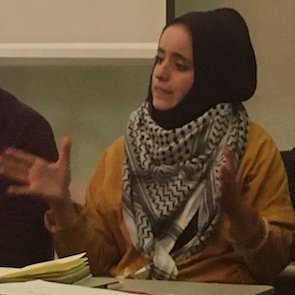
Sameeha Huraini
The annual Front Line Defenders Award for Human Rights Defenders at Risk was established in 2005 to honour the work of HRDs who are courageously making outstanding contributions to the promotion and protection of the human rights of others, often at great personal risk to themselves.
As women who are on the front lines, watching our fathers, brothers, and sons being taken away to prison, or killed in the fields by settlers, we see how the Israeli colonial movement has traumatized generations of Palestinians.
Sameeha Huraini is the Co-Founder, along with her brother Sami Huraini, of the Youth of Sumud movement, based in Al-Tuwani, in the Hebron region of Palestine. In addition to her human rights activism, Sameeha studies English at university, giving her the tools to spread the stories of At-Tuwani, the occupation and the South Hebron Hills across the globe.
Youth of Sumud formed in 2017 in the South Hebron Hills in response to ongoing settler and military aggression and violence against farmers, families and school children in the area. Members of Youth of Sumud have undertaken to revive the village of Saurora, located in the Southern end of the West Bank near the village of At-Tuwani. The village was abandoned in the 1990's because of settler violence from the nearby illegal Israeli outpost of Havat Ma'On, and the ancient cave homes were damaged or demolished. Youth of Sumud rebuilt the caves, and has established a permanent presence in Saurora.
In addition Youth of Sumud has assumed responsibility assuring the safety of schoolchildren from the nearby village of Tuba as they walk between to and from school past the nearby Israeli outpost. Harassment of Palestinian shepherds by Israeli settlers and soldiers is common in the area, and members of Youth of Sumud frequently accompany shepherds from the nearby villages as they graze flocks.

